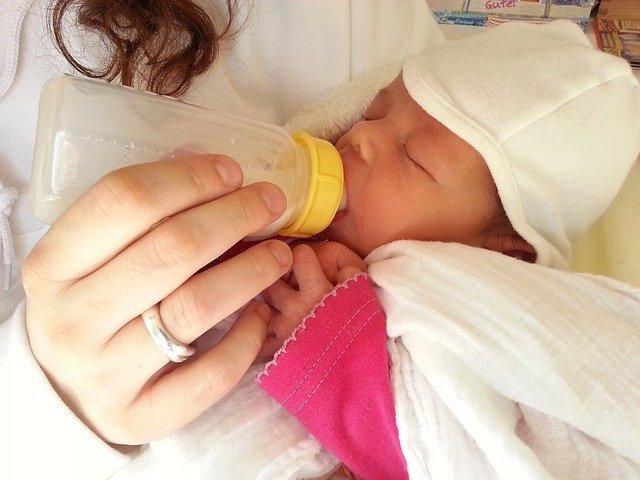Feeding Your Baby
Whether you choose to breastfeed or bottlefeed, you can get your baby off to a good start with all the nutrients and goodness she needs.
Breastfeeding
New parents want to give their babies the very best. When it comes to nutrition, the best first food for babies is breast milk. Experts recommend that babies be breast-fed for six to 12 months.
Why Breastfeeding is The Best for Baby (and also Mom) ?

Nature has designed breast milk for babies. No other food can match it. Breast milk changes with every feed to meet baby’s needs and contains all the nourishment and fluids he/she needs for the first 4 to 6 months. Human breast milk contains at least 100 ingredients not found in formula.
Colostrum, which is the first milk the breast produces, is a clear fluid high in protein and antibodies. It also acts as a laxative to help baby’s first bowel movements. Initially, a breast-fed baby will need to be fed 8-12 times in a 24-hour period, especially since both baby and mother are getting used to the process. Breast milk is more quickly digested than formula. This is another reason why more frequent feeding is necessary. But the extra time spent feeding the baby that first year is well worth it.
As well as containing antibodies against infectious diseases, breast milk protects against developing allergies. No babies are allergic to their mother’s milk, although some babies may have a reaction such as colic to something the mother eats. If she eliminates it from her diet, the problem resolves itself.
The only acceptable alternative to breast milk is infant formula. Bottle-fed infants tend to be fatter than breast-fed infants, but not necessarily healthier.
Solid foods can be introduced after the baby is 4 to 6 months old, but a baby should drink breast milk or formula, not cow’s milk, for a full year. Cow’s milk contains a different type of protein than breast milk. It is good for calves, but human infants can have difficulty digesting it.
Sucking at the breast promotes good jaw development as well for baby. It’s harder work to get milk out of a breast than a bottle, and the exercise strengthens the jaws and encourages the growth of straight, healthy teeth. The baby at the breast also can control the flow of milk by sucking and stopping. With a bottle, the baby must constantly suck or react to the pressure of the nipple placed in the mouth.
Constant suckling at the breast will also stimulate the mammary glands to produce more milk for the baby’s growing appetite. The more frequent a mom breastfeed her baby, the better she is able to produce more milk and help to avoid plugged (blocked) duct that can cause mastitis.
Breastfeeding is also best for mother because it helps the womb and her body to return to its pre-pregnant state. It may be easier for a nursing mother to lose the pounds of pregnancy as well, since nursing uses up extra calories. Lactation also stimulates the uterus to contract back to its original size.
One of the biggest advantages of breast milk is the fact that it is always ready should the baby require feeding and initially this can be at any time of the day or night. You can imagine how much easier that will be if your baby wakes up in the middle of the night or early hours of the morning expecting to be fed. It helps mother to rest at night if she needs to nurse the baby without having to mix and warm up milk. There are no bottles to sterilize and no formula to buy, measure and mix.
Keep a watch on your baby’s weight when breast feeding to ensure that it is getting enough nutrition to gain weight and if not talk to your doctor.
Bottlefeeding

Deciding whether or not to bottlefeed your baby is not a decision that is made lightly. Many mothers that make the decision not to breastfeed or cannot breastfeed for some reasons such as medications, pains, etc, should not feel guilty about choosing to bottlefeed.
While nothing can replace the whole, natural benefits of mother’s milk, using baby formula has several benefits for mother and baby. Baby formulas of today are created to be as close to mother’s milk as possible. These baby formulas are just as nutritious and many are fortified with iron, a key ingredient in helping to prevent anemia in infants.
Another great benefit is portion control. With bottle feeding, you know exactly how much you are feeding your baby. You won’t be left wondering if your child has eaten enough or has been overfed.
Mother who breastfeeds still have to deal with the stares and sometimes comments they may receive when they decide to breastfeed in public. With bottle feeding you eliminate the frustration of dealing with ignorance. You no longer have to stay indoors to avoid the embarrassment of wanting to feed your child in public.
Many mothers may also worry about losing the bonding that can come with breastfeeding. Bottle feeding can still bring the same type of mother and child bonding that breast feeding does. You are still close to your child and able to talk and spend quality time during a feeding. Don’t let the worry of bonding play in your decision to bottle feed.
Another plus to bottle feeding is that moms can get back to living a normal life a lot sooner. Breastfeeding alters a mother’s daily life due to certain factors that must be considered, primarily in the case of medication. Mothers who are prescribed medications must remember to check with their doctor before taking them. Medication can be passed through to baby during breastfeeding. Bottle feeding clears the way for things like medication as well as oral contraceptives. Having the choice to take an oral contraceptive is a concern for many mothers who do not desire to have another child right away.
Bottlefeeding is more convenient during traveling. Baby formula can be stored easily and makes traveling a lot easier. Ready-made baby formula requires no mixing. You can feed your baby its contents right away which is a time saver.
Bottlefeeding also allows others to help you out. You can have others feed your baby when you are busy or because they want to share in the experience such as dad helping out during a feeding or grandparents. This can be a huge help when you are burned out from the day’s activities and need to catch a nap or are not feeling well.
Mothers who choose to bottle feed should never feel like they are making a poor choice. Just like breastfeeding, bottle feeding holds many benefits.
Feeding Baby Solids

Babies get all the nourishment they need from breast milk or formula until they are around six months old. Most parents introduce their babies to solids around six months of age, depending on when baby is ready. Before four months a baby’s digestive and immune system is not ready to take in foods other than milk, as allergies and other problems can develop.
Your baby will show that he is ready for solids by showing an interest in the food you eat. He will no longer be satisfied by milk feeds, and will have good head control. If your baby was premature you may need to wait a bit longer.
Starting Solids Guide and Step-by-step
- Prepare to get messy. Protect baby’s clothes with baby bibs during feeding.
- Start slowly with a little portion. The first feed may be only 1 teaspoon. Use one food only and wait two or three days before starting another food.
- Serve food lukewarm or at room temperature.
- Gradually increase the quantity, from 1 teaspoon to 1-2 tablespoons. If baby’s tongue pushes the food away, or he isn’t interested, it’s best to wait a while longer, then try again.
Check out more weaning tips and baby solid guide here.




Leave a Reply
Want to join the discussion?Feel free to contribute!